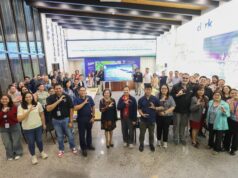ABUCAY, Bataan – Agriculture scientists on Friday said researches on how to further improve agriculture in the country face “many problems especially the lack of funds.”
Dr. Danilo Cardenas, deputy executive director for Research and Development of the Philippine Council for Agriculture, Forestry and Natural Resources Research and Development (PCARRD), could not say the exact amount of money the government has set aside for research but claimed that it is already deteriorating.
He added that lack of funds continue to hound scientists and researchers.
Dr. Teotimo Aganon, director of the Central Luzon Agriculture and Resources Research and Development Consortium (CLARRDEC), and Dr. Feliciano Rosete, CLARRDEC chair, said the funds for research in the Philippines is less than 1 percent of the country’s total budget as compared to Japan’s 3 percent and 1.5 percent in other South East Asian countries.
“The ideal budget to facilitate Research and Development (R & D) investment in the Philippines should be at least 1% of the country’s total annual budget because research should be seen as an asset,” the three scientists said.
They also said that fewer students enroll in agriculture courses despite scholarship programs were offered by Pres. Gloria Macapagal Arroyo to entice more enrollees.
“Libre na pag-aaral sa agrikultura subalit kakaunti pa rin ang mga batang kumukuha ng ganitong kurso kaya’t nakakalungkot na baka dumating ang panahon na wala ng mga scientists at researchers sa pagsasaka,” they said.
Rosete, president of the Ramon Magsaysay Technological School in Iba, Zambales, said there had been a 50 percent decrease in enrollment in agriculture courses in the country. In his school alone, he said that from 500 students, the number went down to 200 students enrolled in agriculture classes.
The three scientists spearheaded the 20th Regional Symposium on Research and Development of CLARRDEC at the Farmers’ Training Center of the Bataan Peninsula State University (BPSU) at an upland village in Abucay town. Scientists and researchers from the provinces of Bataan, Pampanga, Zambales, Bulacan, Nueva Ecija, Tarlac and Aurora attended the symposium.
“CLARRDEC, organized in 1978, is a consortium of 26 agencies and institutions conducting and promoting research and development in agriculture, forestry and natural resources in Central Luzon, according to Dr. Gregorio Rodis, BPSU’s vice-president for Reasearch, Extension and Auxilliary Services.
He said that BPSU is a new member of the consortium but it has already undertaken various researches and launched various programs to help farmers. One is about upland farming system in Bataan and on soil and model conservation.
“Our banner project is the Techno Gabay program where we launched Farmers’ Information Technology Service Center in seven municipalities budgeted by PCARRD for P1.75 million,” Rodis said.
Dr. Delfin Magpantay, BPSU president, welcomed the guests at the huge compound of the former Bataan National Agriculture School at the mountain village of Abucay town.
Cardenas considered CLARRDEC’s contribution in Science as one of the most significant in its 20 year-history. “It garnered 10 out of 10 best papers and in the field of development, seven out of 10, which other consortia in the country has not yet equaled,” the PCARRD official said.
Presented in the symposium were 20 researches, the best ones to be selected by a group of scientists for possible adaptation in Central Luzon.
Dr. Danilo Cardenas, deputy executive director for Research and Development of the Philippine Council for Agriculture, Forestry and Natural Resources Research and Development (PCARRD), could not say the exact amount of money the government has set aside for research but claimed that it is already deteriorating.
He added that lack of funds continue to hound scientists and researchers.
Dr. Teotimo Aganon, director of the Central Luzon Agriculture and Resources Research and Development Consortium (CLARRDEC), and Dr. Feliciano Rosete, CLARRDEC chair, said the funds for research in the Philippines is less than 1 percent of the country’s total budget as compared to Japan’s 3 percent and 1.5 percent in other South East Asian countries.
“The ideal budget to facilitate Research and Development (R & D) investment in the Philippines should be at least 1% of the country’s total annual budget because research should be seen as an asset,” the three scientists said.
They also said that fewer students enroll in agriculture courses despite scholarship programs were offered by Pres. Gloria Macapagal Arroyo to entice more enrollees.
“Libre na pag-aaral sa agrikultura subalit kakaunti pa rin ang mga batang kumukuha ng ganitong kurso kaya’t nakakalungkot na baka dumating ang panahon na wala ng mga scientists at researchers sa pagsasaka,” they said.
Rosete, president of the Ramon Magsaysay Technological School in Iba, Zambales, said there had been a 50 percent decrease in enrollment in agriculture courses in the country. In his school alone, he said that from 500 students, the number went down to 200 students enrolled in agriculture classes.
The three scientists spearheaded the 20th Regional Symposium on Research and Development of CLARRDEC at the Farmers’ Training Center of the Bataan Peninsula State University (BPSU) at an upland village in Abucay town. Scientists and researchers from the provinces of Bataan, Pampanga, Zambales, Bulacan, Nueva Ecija, Tarlac and Aurora attended the symposium.
“CLARRDEC, organized in 1978, is a consortium of 26 agencies and institutions conducting and promoting research and development in agriculture, forestry and natural resources in Central Luzon, according to Dr. Gregorio Rodis, BPSU’s vice-president for Reasearch, Extension and Auxilliary Services.
He said that BPSU is a new member of the consortium but it has already undertaken various researches and launched various programs to help farmers. One is about upland farming system in Bataan and on soil and model conservation.
“Our banner project is the Techno Gabay program where we launched Farmers’ Information Technology Service Center in seven municipalities budgeted by PCARRD for P1.75 million,” Rodis said.
Dr. Delfin Magpantay, BPSU president, welcomed the guests at the huge compound of the former Bataan National Agriculture School at the mountain village of Abucay town.
Cardenas considered CLARRDEC’s contribution in Science as one of the most significant in its 20 year-history. “It garnered 10 out of 10 best papers and in the field of development, seven out of 10, which other consortia in the country has not yet equaled,” the PCARRD official said.
Presented in the symposium were 20 researches, the best ones to be selected by a group of scientists for possible adaptation in Central Luzon.




